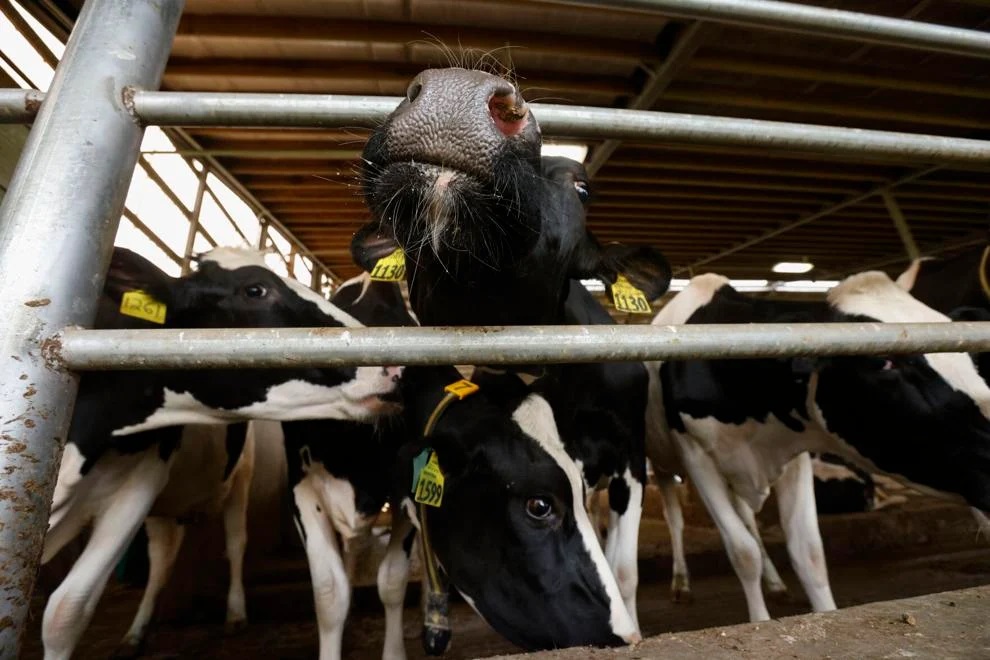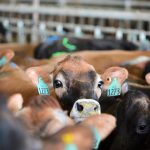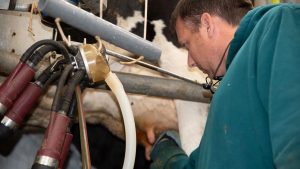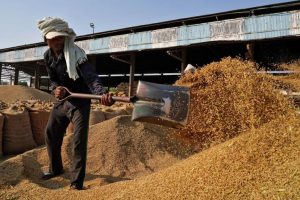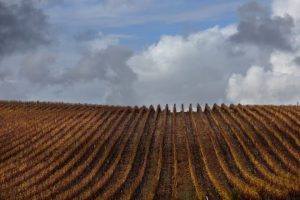
When agricultural specialists from the state Department of Natural Resources inspect a CAFO — a concentrated animal feeding operation — they would prefer cloudy skies with pouring rain.
Rain can help inspectors detect violations of permits designed to stop excess manure from overflowing and polluting nearby water sources. When too much manure enters a lagoon, for example, bright-green algae blooms and dead marine life can surface as evidence.
In 2021, a University of Wisconsin-River Falls study estimated that excess manure from each CAFO being built in Wisconsin costs more than $200,000 a year in surface water damages. But regulatory actions against the farms are rare.
Jeffrey Hadachek, a UW-Madison economist who studies agriculture, called the case a milestone in the state’s oversight of a growing sector in farming. Nationwide, researchers estimate 90% of American livestock is now raised at a CAFO with each having over 1,000 animals.
“This sets a precedent, not only for the DNR, but for the public in general that these are cases which can be brought forward,” Hadachek said. “These regulations, laws and policies are in place for a reason.”
Tyler Dix, who oversaw CAFO permits at the DNR until this month, said Mlsna Dairy Supply’s wastewater permit expired in 2015 and the operation was not timely in reapplying. “Dragging their feet,” he said.
Phil Mlsna, the owner of Mlsna Dairy Supply, said his farm was unable to receive permits because of roadblocks in the application process. More collaboration and transparency is needed at the DNR on its permitting rules, he said.
Mlsna said he paid $16 million to make changes to comply with state regulations. He emphasized wanting to take care of the environment and noted he spent $80,000 to clean up the Little La Crosse River after a 100-year flood in 2018. The DNR didn’t have funding to clean up the river, he said.
“They don’t want to work with you. They want to break you,” Mlsna said.
Sara Walling, who oversees water and agriculture programs at the environmental group Clean Wisconsin, was surprised by the case against Mlsna Dairy Supply. In recent decades, farms in the state have evolved from “not knowing what the hell we were talking about” with nutrient management to having regulations become “common language,” she said.
Walling previously worked at Wisconsin’s agriculture department for 16 years and held positions overseeing farms’ nutrient management, bioenergy and climate change efforts. Efforts like producer-led watershed protection grants “have been hugely successful” in reducing agricultural runoff, she said.

When Walling first visited Mlsna Dairy Supply in 2007, the operation was “considered to be a very conservation-minded farm,” she said.
Dix said Mlsna Dairy Supply is an unusual case and that most CAFO owners in the state are compliant with regulations.
In January, at least 336 CAFOs were operating in Wisconsin. Dix’s staff of 15 agricultural specialists oversees the farms. At the beginning of this year, a Calumet County judge ruled the DNR can maintain wastewater permits after dairy groups had challenged the regulations.
Oversight of CAFO permits “relies a lot on self reporting,” Dix said. Farmers are required to report their own activities with manure. State regulators monitor those reports “to ensure they’re meeting their discharge limitations.”
DNR inspectors try to check farms every five years, Dix said. If these inspections determine a facility needs to be evaluated further, the farm must hire an engineer. Between five-year inspections, Dix said, the state relies on citizens for help monitoring farms. Complaints, he said, often lead specialists to complete additional inspections.
“There’s a lot more eyes and ears out there than the 15 staff we have doing inspections, so we do rely on that information from the public to start the inspection process if something’s going wrong,” he said.
Mlsna said he wishes an agricultural specialist visited his farm more often to see his progress and give on-site direction rather than send him notices of violations after the fact.
“In eight years, I’ve had seven new people (agricultural specialists) and … I just got another one about a month ago,” said Mlsna, who has been in the milking business for 45 years.
In 2016, the DNR asked state lawmakers to increase CAFO permit staffing to 21 agricultural specialists when the state had about 285 concentrated animal feeding operations. Dix said the agency is making do, though.
“That (15 specialists) is not as many staff as we would hope, but we get by with what we have available to us,” he said.
Walling worries that as farms grow, so does the likelihood to shortcut regulation.
“When eyes aren’t on you, it’s easy to cut corners and feel like you have that latitude to make those changes or disregard requirements if nobody’s really looking,” she said.
Over the last decade, Dix said, Wisconsin is gaining about five concentrated animal feeding operations a year. Many of the new ones are an existing operation expanding to the size of a CAFO.

In Pierce County — five counties northwest of Monroe — residents are advocating against the proposed expansion of what would be among the largest CAFOs in the state, citing concerns over water quality. Ridge Breeze Dairy wants to grow from roughly 1,700 to 6,500 cows by 2025.
The farm operates within the Rush River watershed, which drains into the Mississippi River like other watersheds in western Wisconsin. According to DNR records, Ridge Breeze Dairy has experienced 11 manure spills since opening in 2013. However, WPR reports the nitrate levels in wastewater released by the farm have remained within federal health standards.
Expanding Ridge Breeze Dairy would require the DNR to amend the farm’s existing wastewater discharge permit. The farm’s permit application says it wants to add three waste storage facilities to account for 77.7 million gallons of manure and process wastewater that will be produced annually.
A UW-Stevens Point database relying on water quality samples collected by homeowners and state agencies shows that 15% of Pierce County’s groundwater exceeds health standards for nitrate pollution. In Dane County, the ratio is about 22%.
Dane County is home to a dozen permitted concentrated animal feeding operations, according to the DNR.
“Madison is unique in that … the way we see ourselves from the structure of our community, is very water-centric. We’re a community that is built around lakes,” Walling said. “What happens upstream from Madison in the rural community areas of Dane County and even more northerly than that certainly has impacts on our day-to-day livelihoods in the city.”
However, Hadachek emphasized that rural communities are bearing the brunt of pollution from concentrated animal feeding operations.
“CAFOs have to go in rural areas where agriculture is, and the households and individuals in rural areas tend to be more groundwater dependent than houses in urban areas that have access to public supply,” Hadachek said. “(These) are coincidences that result in those rural communities that rely on private, domestic wells to be more disproportionately exposed than you and me in Madison.”
You can now read the most important #news on #eDairyNews #Whatsapp channels!!!
🇺🇸 eDairy News INGLÊS: https://whatsapp.com/channel/0029VaKsjzGDTkJyIN6hcP1K
